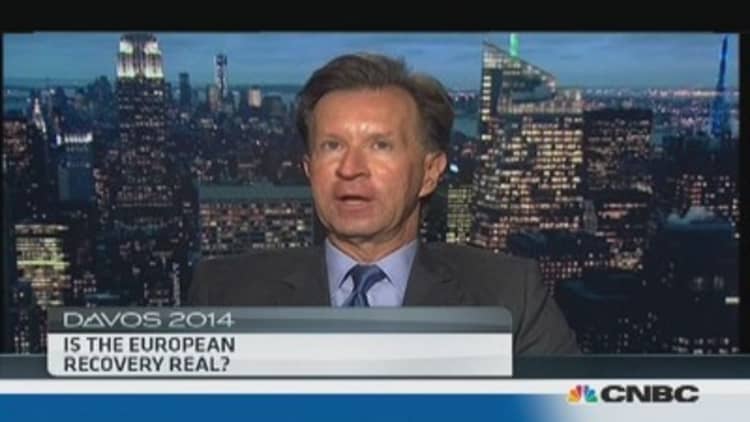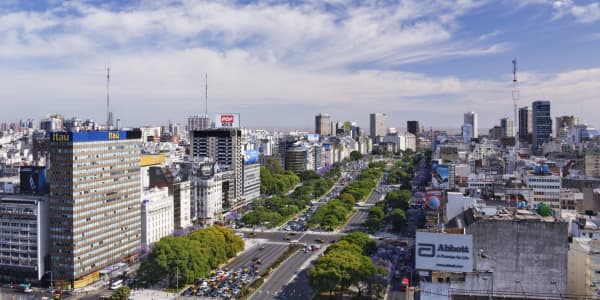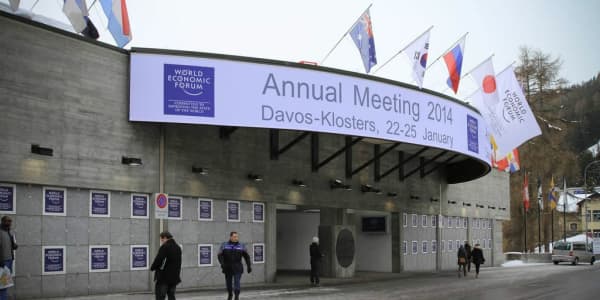The world's leaders are struggling to win public trust, a new survey reveals, with governments the least-trusted institutions for a third consecutive year.
The 2014 Edelman Trust Barometer - released Tuesday to coincide with the beginning of the 2014 World Economic Forum in Davos - surveyed 27,000 people from 27 countries using 20 minute online interviews. The results of the annual survey revealed the largest ever gap between trust in government and business.
Trust in government was below 50 percent in 22 of the 27 countries surveyed, the report said, with strikingly low levels in western Europe, particularly in Spain (14 percent), Italy (18 percent) and France (20 percent). In total, trust in government dropped from 48 percent in 2013 to 44 percent this year, whilst trust in business leaders stabilized at 58 percent.
(Read more: Is France heading fora new recession?)
The findings come at a time of political turmoil in several countries. The popularity of Francois Hollande, president of France, has dropped to the lowest levels since the country started taking opinion polls, according to a survey by research firm BVA in October, with only 26 percent of French people having a positive opinion of the Socialist leader.
Italy was paralyzed by deadlock last year, with Prime Minister Enrico Letta invited to form a government in April following inconclusive elections in February. He has since ruled in an awkward coalition with Silvio Berlusconi's Forza Italia party, before the latter's withdrawal of support from Letta and Berlusconi's recent ejection from politics.
(Read more: A 'Happy New Year'for Italy? Don't bet on it)
The U.S. hasn't covered itself in glory either. A budget row last year saw economists warn of dire global economic consequences unless an agreement to raise the borrowing limit was reached. In October, disputes over funding of "Obamacare" health insurance reforms prompted a 16-day partial shutdown for many agencies, leaving thousands of federal workers without a job.
America's confidence in intelligence practices also took a hit in 2013. Damaging disclosures appeared in newspaper reports based on revelations made by former U.S. spy agency contractor Edward Snowden. They detailed the surveillance tactics from the National Security Agency program.
Businesses setting policy?

In contrast to the diminishing trust held in politicians, confidence in businesses remains stable. Global public relations firm Edelman said this was buoyed by the perception that businesses have made demonstrable change in the form of better products and new leadership.
"This is a profound evolution in the landscape of trust from 2009 where business had to partner with government to regain trust, to today, where business must lead the debate for change, "Richard Edelman, the president and CEO of Edelman said in a press release.
The report – published annually for the last 14 years - showed that 79 percent of respondents believe governments should not be working alone when setting policy.
"A majority of respondents believe that business can pursue its self-interest while doing good work for society. And 74 percent believe that business should be involved in formulating regulation in the energy and food industries," the report said.
(Read more: World in 2014 is better…but not good enough: El-Erian)
Edelman added that typically it was government that had been called upon to create the context for change but, in the eyes of respondents, it was either incapable or unwilling to do so.
"People trust business to innovate, unite and deliver across borders in a way that government can't. That trust comes with the expectation and responsibility to maintain it. Therefore, CEOs must become chief engagement officers in order to educate the public about the economic, societal, political and environmental context in which their business operates," he said.
However, he warned that businesses shouldn't commit a huge error in judgment and interpret these shifts as a chance to push for deregulation. The survey notes that people want more regulation in several industries including financial services,energy and food and beverage.
"Events of the past 12 months, including the $13 billion fine for JPMorgan and the largest-ever bankruptcy in Latin America with the failure of Eike Batista's EBX deep water oil drilling firm, coupled with the memory of the recession of 2008, have renewed concerns about business' ability to self-regulate," Edelman said.





